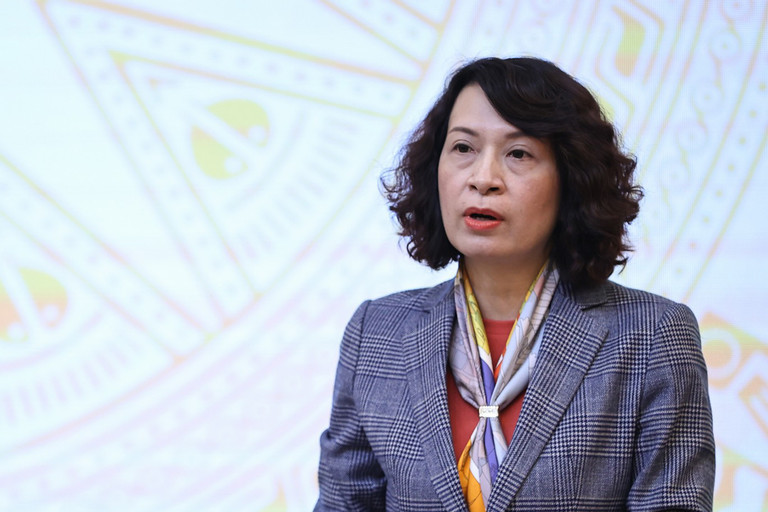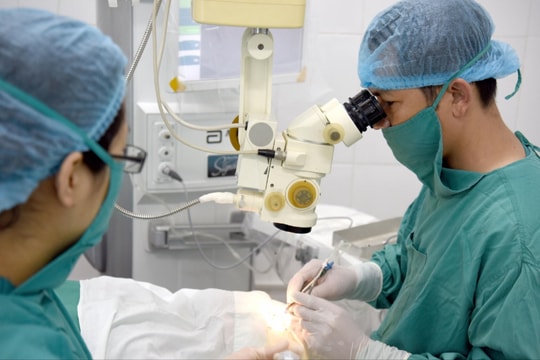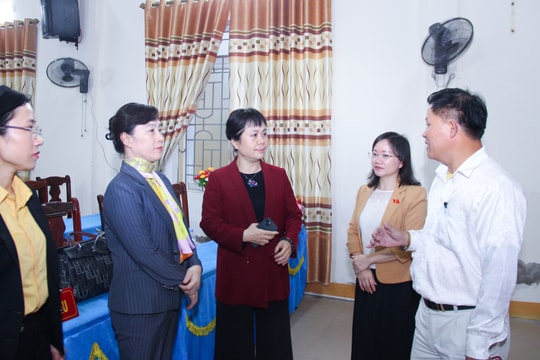Deputy Minister of Health: Hospital transfer procedures cause trouble, create asking and giving
The Deputy Minister of Health admitted that the procedures for transferring patients and issuing referral papers still cause inconvenience to patients, and there are even negative cases where patients are asked to be released or kept, causing frustration.
Late on the afternoon of December 6, at the regular Government press conference, the press asked the leaders of the Ministry of Health about people's complaints about the procedures for requesting referral papers at hospitals and the problem of the lack of vaccines for expanded immunization.
Deputy Minister of Health Nguyen Thi Lien Huong said that after 15 years of promulgating the Health Insurance Law, the health insurance coverage rate has now reached nearly 91 million people, about 92% of the population. The number of health insurance examinations and treatments has also increased, with 150.5 million medical examinations and treatments in 2022.
Every year, the Health Insurance Fund spends more than VND110,000 billion on medical examination and treatment. The funds from the Health Insurance Fund for medical examination and treatment costs account for a large proportion of hospital revenue.

According to Ms. Huong, one of the important factors to achieve these results is the organization of initial health insurance registration and referral. This regulation aims to contribute to ensuring the stability, balance and sustainability of the health care system.
However, the Deputy Minister of Health admitted that the regulations for initial medical examination and treatment registration are still heavily administrative. The procedures for referral and issuance of referral papers still cause inconvenience to patients, and there are even negative cases where patients are asked to be released or kept, causing frustration.
Since January 1, 2016, the connection of medical examination and treatment between commune health stations, general clinics and district hospitals and from January 1, 2021, the application of provincial connection nationwide has also created many problems related to the line, crossing the line, transferring lines, causing overload at the upper level and reducing the rate of medical examination and treatment at grassroots health facilities.
According to Ms. Huong, central-level facilities are assigned the function of the final line, focusing on treating serious illnesses, implementing specialized techniques, scientific research, and training, so they cannot focus on examining and treating common diseases and providing primary care.
Overloading also risks causing errors, accidents, reducing the quality and effectiveness of treatment, affecting patients.
To ensure the highest quality of patient service, the Ministry of Health has been strengthening direction and synchronously implementing solutions to improve capacity and expand the scope of health insurance payment for lower levels.
The Ministry also applies electronic referral forms to facilitate and speed up the issuance of referral forms; establish people's health management records and expand the family doctor model, improving the quality of primary health care.
In addition, the Ministry of Health aims to promote activities on directing the lower levels, satellite hospitals, rotating staff, and training and transferring techniques to enhance the capacity and professional qualifications of lower levels.
Regarding expanded immunization vaccines, the Deputy Minister of Health informed that according to the provisions of the Budget Law, localities proactively carry out procedures to purchase vaccines from their local budgets. However, this faces many difficulties. Therefore, the Ministry of Health is the focal agency to purchase vaccines for distribution nationwide.
By 2024, vaccination will be given in 30% of provinces/cities.
For domestically produced vaccines, the Ministry of Health has reviewed legal regulations and implemented purchases in the form of orders and approved specific price plans, assigned the National Institute of Hygiene and Epidemiology to sign contracts and allocate.
Regarding the 5-in-1 vaccine that must be imported, the Ministry has assigned the National Institute of Hygiene and Epidemiology to conduct bidding procedures to purchase DPT-VGB-Hib vaccine according to regulations in the form of open bidding.
While waiting for the procedures to be completed, the Ministry of Health said it had proactively sought aid and funding sources, received 258,000 doses of the 5-in-1 vaccine and distributed them to localities. In addition, there are 490,600 more doses of vaccine supported by Australia, expected to arrive in Vietnam in December.
The Ministry of Health has issued guidelines for provinces on supplementary and catch-up vaccinations for localities. Missing doses will be reviewed, and a list of children needing to be vaccinated with each type of vaccine will be made so that health stations can plan specific implementation.
In 2024, the Deputy Minister said that he will continue to deploy and expand the activities of reviewing vaccination history and follow-up vaccination in 30% of provinces/cities to be more proactive in disease prevention for children and the community.
The Ministry of Health is also directing relevant units to avoid vaccine shortages and ensure no interruptions. Localities are proactive in monitoring, detecting epidemics, responding to and implementing vaccination measures for high-risk groups in the epidemic area to contain and prevent the disease from spreading.



